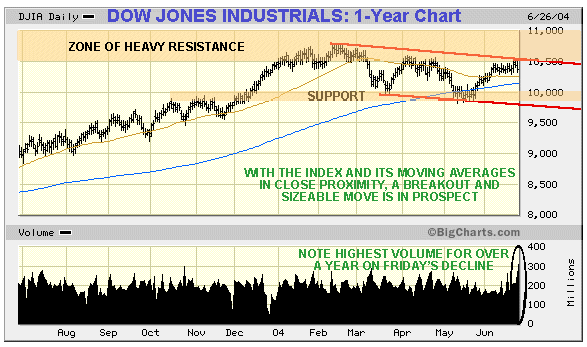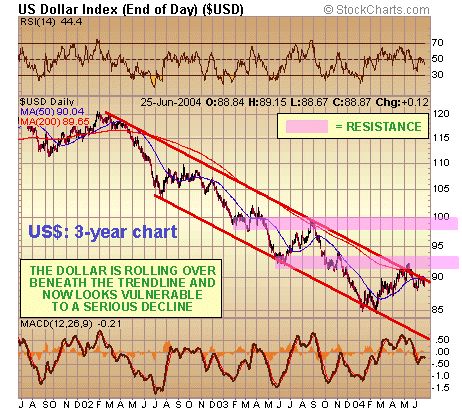.
|
|||
The Calm Before the Storm28 June 2004 Even to the most complacent
investor, the quiescence of the financial markets given the backdrop
of economic and political turbulence and deep, unaddressed, systemic
financial and economic problems is eerie. Several writers, such
as Adam Hamilton and John Maudlin, have drawn attention to the
unusual set of circumstances current in the markets. Nonetheless,
these fundamental major financial and economic problems, highlighted
and described in detail by the some of the best analysts on the
web, such as Jim Puplava and Richard Russell, have far from disappeared.
Instead, they continue to worsen.
Whilst the DJIA and S&P500
appear to display remarkably little volatility, often presaging
a major change, the 200 day MA climbs to meet the 50 day MA,
which should be "the moment of change;" shown on Figure
1. Given the Feds' "high gear" money printing operation,
some writers believe that the stock markets will move upwards
to new highs at this juncture. However, the US dollar, as shown
on Figure 2, has failed to significantly breach the 200 day MA,
and last week ended with it turning south again to conform with
its long term, 30-month bear market, underscoring the runaway
US multiple deficits and hitherto historically unprecedented
fiat creation. New US debt is now running at more than 5% of
GDP and is still accelerating under a President who appears to
exert no financial control whatsoever. A collapsing US dollar
is highly unlikely to result in improved US competitiveness,
and, hence, an improved trade balance, as the issues are very
much more deep-seated than mere competition based on price. Indeed,
the falling US dollar is depreciating the value of all US based
assets and securities, with potentially calamitous consequences.
As a substantial proportion of US treasuries and equities are
held by foreigners, one may expect them to demand compensation,
including a higher yield on bonds, to offset growing exchange
losses, and, furthermore, to exit US equities in favor of those
listed on foreign bourses in Euros, Sterling or Swiss Francs,
in order to avoid currency losses.
Mr. Greenspan appears to believe
he has the situation well under control. His "gradualist"
approach to raising interest rates is a measure of his greatest
nightmare, the terrible twins "FANNIE MAE and FREDDIE MAC."
He now is in the unhappy position of facing the eventual collapse
of these institutions, which, because of the immense scale of
their liabilities, will bring down the entire US financial system
with them. The Fed is already "way behind the curve"
with raising interest rates, as the markets are already some
200 basis points ahead of him. However, this situation is likely
to worsen dramatically over the coming weeks and months. With
inflation already running way ahead of the manipulated CPI, and
accelerating, prospects of the Fed continuing its "gradualist"
approach look grim. Further collapse of the dollar can only accelerate
inflationary pressures and push bond yields up. These factors
will eventually force the Fed's hand over interest rates. Merely
threatening action and following up with "watered down compromises"
will not keep the markets tame for much longer. Copyright
© Nigel Maund 2004. All Rights Reserved. |


